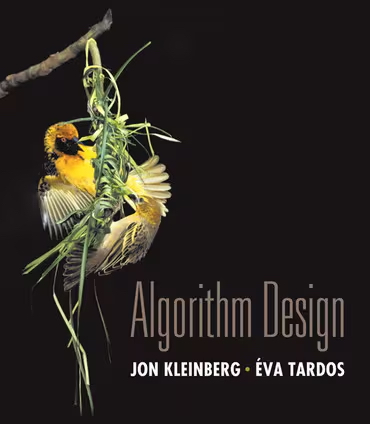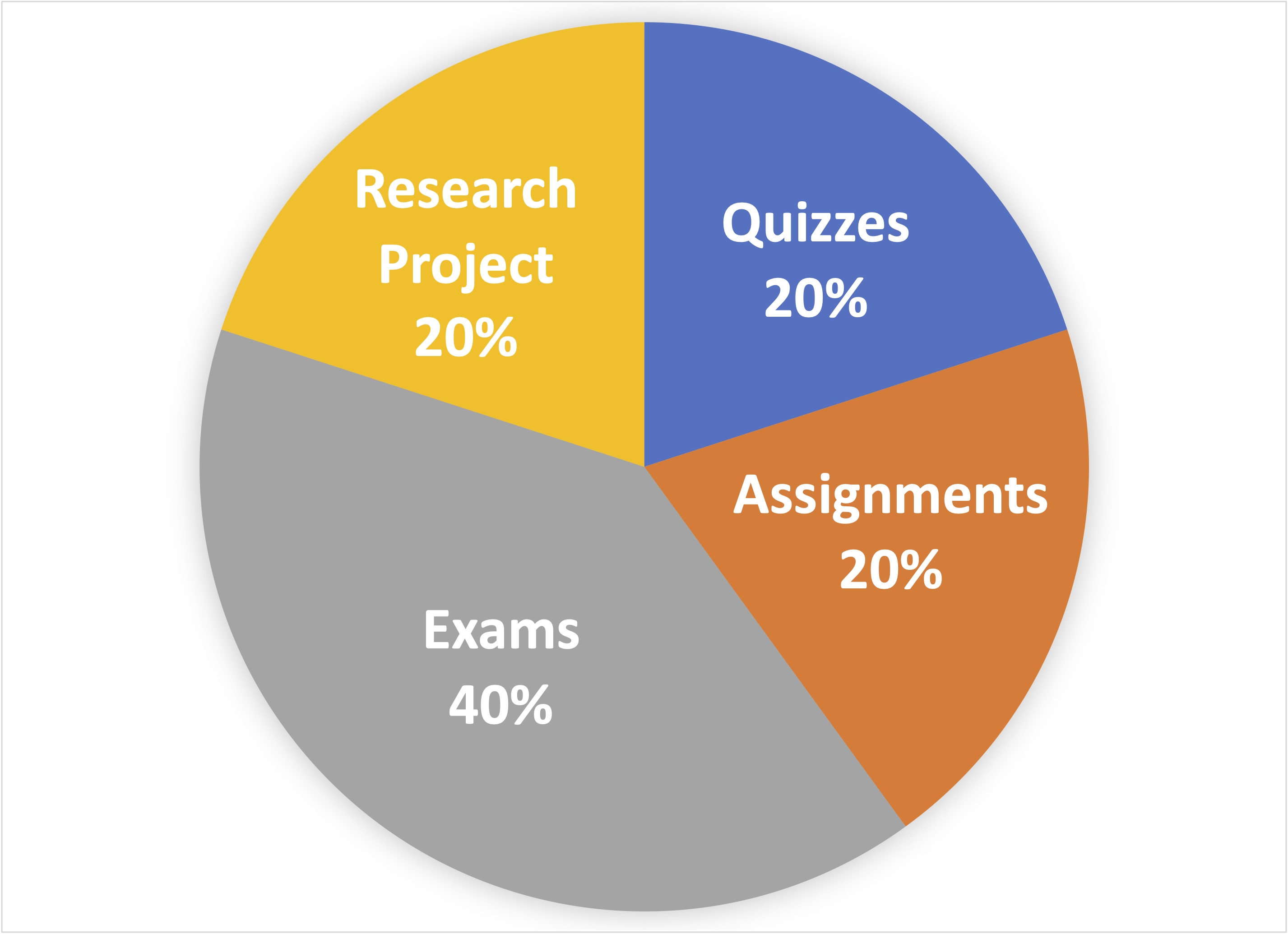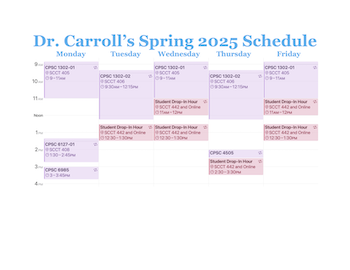Course Syllabus
Course Information
Course name and number: CPSC 4115 - Algorithms
Credit Hours: 3
Course Description: This course emphasizes the understanding of data structures and algorithms from an analytical perspective rather than from an implementation standpoint. The concepts developed allow discussion of the efficiency of an algorithm and the comparison of two or more algorithms with respect to space and run-time requirements. Analytical methods are used to describe theoretical bounds as well as practical ones. In general, this course addresses the constraints that affect problem solvability.
Prerequisites: CPSC 2108 with a minimum grade of "C" or better and MATH 5125U with a minimum grade of "C" or better
Course Offering (days/times and room): 3:00 – 4:15 PM Mondays and Wednesdays in SCCT 409
Section: 01
Course Registration Number (CRN): 88490
Websites:
- The course schedule, assignment descriptions, etc. are hosted at http://csc.ColumbusState.edu/carroll/4115/.
- Grades for each assignment, assignment submissions, quizzes, etc. are hosted in CougarVIEW.
The last day to drop without a grade and receive a 100% refund: Friday, August 15, 2025
Deadline to withdraw with a WP (Withdraw Pass): Friday, October 10, 2025
Instructor Information
- Name: Dr. Hyrum D. Carroll
- E-mail: carroll_hyrum@ColumbusState.edu
- Phone: (706) 507-8182
- Student Drop-in Hours:
I will keep the following Student Drop-In Hours. I will be both in my office and available online. I can also be available at other times by scheduling an appointment at https://drcarroll.youcanbook.me/. During my regular Student Drop-In Hours (if I don't have a meeting) you can start a video chat with me by clicking HERE.
Student Drop-In Hours Day Times Mondays 12:00 – 1:00 PM
2:00 – 3:00 PMTuesdays 12:00 – 1:00 PM Wednesdays 12:00 – 1:00 PM
2:00 – 3:00 PMFridays 12:00 – 1:00 PM Walk-ins welcome and other times by appointment

Textbooks and Materials
Required Textbook
 Algorithm Design, by Jon Kleinberg and Eva Tardos (1st Edition) (ISBN 13: 9780321295354)
Algorithm Design, by Jon Kleinberg and Eva Tardos (1st Edition) (ISBN 13: 9780321295354)
Optional Textbooks
 Algorithms, Jeff Erickson ISBN: 978-1-792-64483-2, (free)
Algorithms, Jeff Erickson ISBN: 978-1-792-64483-2, (free)- Introduction to Algorithms, Fourth Edition by Thomas H. Cormen, Charles E. Leiserson, Ronald L. Rivest and Clifford Stein, ISBN: 9780262046305, Publisher: MIT Press
Modules
- Orientation & Overview
- Algorithm Analysis
- Graphs
- Greedy Algorithms
- Divide and Conquer
- Dynamic Programming
- Network Flow
- NP and Computational Intractability
Course Learning Outcomes
Upon completion of this course, students will- Learn how to design efficient algorithms and to recognize situations where this is not possible.
- Analyze the asymptotic performance of algorithms.
- Demonstrate a familiarity with major algorithms and data structures.
- Apply important algorithmic design paradigms and methods of analysis.
- Synthesize efficient algorithms in common engineering design situations.
Activity Expectations and Assignment Requirements
Attendance
Attendance is required by the university and will be recorded at the beginning of each class. It is the student's responsibility to independently cover any materials missed. Makeup quizzes or exams are generally not given, so please make sure you are present for all quizzes and exams.
I expect each student to be in attendance for each class in-person. Attendance will be calculated by your arrival and duration in class. It is your responsibility to make sure your attendance gets recorded correctly for every class meeting. If you can not make a class, please inform me and get the relevant materials from a classmate.
Students that do not attend both of the first two lectures may be dropped from the course. For this course, excessive absences (the point at which you can be dropped from the course and assigned a WF (Withdrawal Failing)) is defined as missing the equivalent of two or more weeks of classes. Refer to the CSU Catalog (https://catalog.columbusstate.edu/academic-regulations/undergraduate-academic-regulations/) for more information on class attendance and withdrawal.
Computers are permitted in lecture for note taking and completing exercises. Other activities such as web surfing, stock trading, and social networking are inappropriate. Not only do they distract you but also others.
Attendance Bonus: Research shows a strong positive correlation between attending class and a good grade in that class.
To make that correlation even more positive, the following attendance bonus is offered.
If a student attends each class, then their overall course grade will be increased by 1%.
If a student only misses the equivalent of one class, then 0.67% will be added; if a student only misses the equivalent of two classes, then 0.33% will be added.
No bonus will be applied for students missing the equivalent of three or more classes.
Note: University events with required attendance will not penalize your attendance bonus.
AI Policy
You are allowed to use Generative AI tools like ChatGPT or Microsoft CoPilot for specific assignments, as designated by the instructor. You must acknowledge the use of AI and properly attribute it. This includes providing in-text citations, quotations, and references.
You should include the following statement in assignments to indicate use of a Generative AI Tool: "The author(s) would like to acknowledge the use of [Generative AI Tool Name], in the preparation of this assignment. The [Generative AI Tool Name] was used in the following way(s) in this assignment [e.g., brainstorming, grammatical correction, citation] in the [which portion of the assignment]."
*You should be cautious and avoid sharing confidential or personal information when using these tools. Remember, anything you input into these tools could potentially be stored and used to improve the tool’s algorithms.
Research Project
You get to complete a research project this semester in teams of up to three students. Deliverables include a proposal, written paper and a presentation (during the final exam time). Instructions are found at http://csc.columbusstate.edu/carroll/4115/projects/researchProject.pdf. Submit your deliverables to the appropriate Assignments in CougarVIEW.Exams
There will be two exams during the regular semester. They will be proctored using Respondus LockDown Browser. It is known to not work with the following devices:
- Chromebooks
- iPads/tablets
- Android devices
- Smartphones
Final Exam Time
The final exam time is Friday, December 5, 2025, 4:15 – 6:15 PM. This time will be used for research project presentations.Grading
Grading category weights:

Each of the grading categories is capped at 100%.
| % Range | Course Grade |
|---|---|
| 90 – 100 | A |
| 80 – 89 | B |
| 70 – 79 | C |
| 60 – 69 | D |
| <60 | F |
Expectations
WHAT YOU CAN EXPECT FROM ME
- I will be prepared for lecture each day and will energetically present the material. I will ask questions to verify learning and understanding. I will answer all questions. They can be asked before class, during class, after class, via email or phone or during my Student Drop-in Hours (listed above).
- Below are my target response times:
Target Response Times Deliverable Target Email responses ≤ 2 school days Quizzes posted ≥ 4 days (so that it's open at least 3 days) Assignments posted ≥ 5 days before it's due Projects posted ≥ 7 days before it's due Quizzes graded ≤ 2 classes later Assignments graded ≤ 4 school days Discussion boards reviewed ≤ 5 school days Projects graded ≤ 7 days Exams graded ≤ 2 classes later
WHAT IS EXPECTED FROM YOU
Information regarding student rights and responsibilities can be found in the CSU Student Handbook.
As a student in this course, you are responsible to:
- Be respectful to both your peers and instructors in all interactions.
- Manage your time and maintain the discipline required to meet the course requirements.
- Be prepared to ask questions to maximize your understanding of the material.
- Complete all readings and watch all assigned videos,
- Complete all assignments,
- Complete all quizzes and exams,
- Ask questions when something is not clear.
- Actively participate in classroom discussions.
- Submit work that is completely your own creation and not author by someone or something else.
Time Commitment
The amount of time it will take you to complete the work for the course will depend on many factors, which will vary with each individual. The ACM recommends the following: "As a general guideline, the amount of out-of-class work is approximately three times the in-class time. Thus, a course that is listed as requiring 3 hours typically entails a total of 12 hours (3 in class and 9 outside)." Student in my classes typically spend more time than this guideline. Students will be expected to spend this time outside class reading the book, online materials and other materials; writing solutions to exercises and projects. It will be helpful to set aside regular study time when you can work uninterrupted.
Course Communication
- Use your official CSU account for all e-mail communication.
- Regularly check your official CSU email (at least every 36 hours).
- Follow common sense in writing and sending e-mail. As this course is a semi-public space, be cautious about sharing personal information such as your address or phone number.
- Read and think about e-mail before sending. Email is a permanent record of your communication.
- To help me prioritize responding to your email, please start the subject line with "CPSC 4115: ".
Technical Requirements/ Support
See the CougarVIEW Starter Guide for support with navigating this system.
Hardware Requirements
See the System Checker here. (GeorgiaVIEW’s system checker is compatible with CougarVIEW.)
Software Requirements
- An office suite such as Microsoft Office or Open Office
- Microsoft Office 365 is available free to all CSU students through MyCSU.
- OpenOffice can be downloaded for free.
- Acrobat Reader offers additional features for PDF files.
Browser Plugins (.pdf files, QuickTime files, .mp4 files) can be obtained at a browser's website:
Privacy Policies
Below are the links to the privacy policies for the tools that we will be using in this course:CSU Institution-wide Policies
Academic Honesty
All students are expected to recognize and uphold standards of intellectual and academic integrity. Students should submit only the products of their own efforts for credit. Dishonest work will not be accepted for academic credit. Refer to the CSU Student Handbook (2024–2025) for the full policy.
ADA and 504 Statement
Columbus State University provides reasonable accommodations under the ADA and Section 504. Contact the Center for Accommodation and Access (Schuster Student Success Center, Room 102, (706) 507-8755, caa@columbusstate.edu) as early as possible to begin this process.
Title IX Discrimination
Title IX prohibits harassment and discrimination based on sex, including sexual misconduct and pregnancy-related conditions. For concerns, contact:
- Title IX Coordinator: Sarah Secoy – secoy_sarah@columbusstate.edu – (706) 507-8755
- Deputy Title IX Coordinator: Dr. Amber Dees – dees_amber@columbusstate.edu – (706) 507-8634
CougarVIEW Accessibility Statement
CougarVIEW (D2L Brightspace) is designed to support accessibility and meets WCAG 2.1 Level AAA standards and Section 508 compliance. Visit D2L Accessibility for more information.
